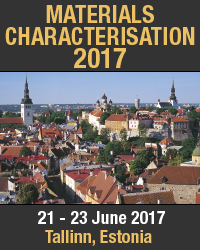8th International Conference on Computational Methods and Experiments in
Material and Contact Characterisation
21 - 23 June, 2017
Tallinn, Estonia
Introduction
The aim of the conference is to facilitate interaction between the research and industrial community and discuss the latest developments in this rapidly advancing field. The meeting responds to the demand for high quality production for both industry and consumer, which has led to rapid developments in materials science and engineering. This requires the characterisation of the properties of the materials.
Of particular interest to industry and society is the knowledge of surface treatment and contact mechanics of these materials to determine the in-service behaviour of components subject to contact conditions. Modern society requires systems that operate at conditions that use resources effectively. In terms of components durability, the understanding of surface engineering wear frictional and lubrication dynamics has never been so important.
Current research is focussed on modifications technologies that can increase the surface durability of materials. The characteristics of the system reveal which surface engineering methods should be chosen and as a consequence it is essential to study the combination of surface treatment and contact mechanics.
Combinations of different experimental techniques as well as computer simulation methods are essential to achieve a proper analysis. A very wide range of materials, starting with metals through polymers and semiconductors to composites, necessitates a whole spectrum of characteristic experimental techniques and research methods.
The conference is a result of a series of meetings that started as early as 1993 in Southampton on contact mechanics and previous meetings on the wider field of material characterisation dating from the 2003 conference in Santa Fe, New Mexico. The papers presented at all those conferences are permanently archived in the eLibrary of the Wessex Institute (www.witpress.com/elibrary) where they are easily accessible in Open Access format to the international scientific community.
Of particular interest to industry and society is the knowledge of surface treatment and contact mechanics of these materials to determine the in-service behaviour of components subject to contact conditions. Modern society requires systems that operate at conditions that use resources effectively. In terms of components durability, the understanding of surface engineering wear frictional and lubrication dynamics has never been so important.
Current research is focussed on modifications technologies that can increase the surface durability of materials. The characteristics of the system reveal which surface engineering methods should be chosen and as a consequence it is essential to study the combination of surface treatment and contact mechanics.
Combinations of different experimental techniques as well as computer simulation methods are essential to achieve a proper analysis. A very wide range of materials, starting with metals through polymers and semiconductors to composites, necessitates a whole spectrum of characteristic experimental techniques and research methods.
The conference is a result of a series of meetings that started as early as 1993 in Southampton on contact mechanics and previous meetings on the wider field of material characterisation dating from the 2003 conference in Santa Fe, New Mexico. The papers presented at all those conferences are permanently archived in the eLibrary of the Wessex Institute (www.witpress.com/elibrary) where they are easily accessible in Open Access format to the international scientific community.
Conference Topics
The following list covers the topics to be presented at the meeting. Papers on other subjects related to the objectives of the conference are also welcome.
- Computer methods and simulation
- Experimental and measurement techniques
- Mechanical characterisation and testing
- Materials under extreme conditions
- Polymers and plastics
- Advances in composites
- Micro and macro characterisation
- Corrosion and erosion
- Damage, fatigue and fracture
- Recycled materials
- Materials and energy
- Surface problems and contact mechanics
- Surface modification and treatments
- Thick and thin coatings
- Tribomechanics and wear mechanics
- Biomechanical characterisation
- Biomechanical applications
- Case studies
Find out more on the conference webpage.
